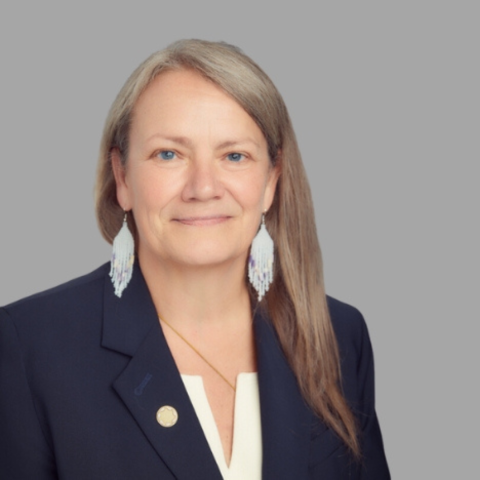
Kimberly Murray, a Mohawk lawyer, researcher, teacher, and executive leader, has dedicated much of her legal career to promoting reconciliation between Indigenous and non-Indigenous people and advocating for Indigenous communities. In January, she will assume her new role as Queen’s National Scholar in Indigenous Legal Studies.
“Through her exceptional scholarly and advocacy experience,” says Dean Colleen M. Flood, “Kimberly will help reinforce our Faculty’s expertise in Indigenous law, contribute to our innovative approaches to teaching and learning about Indigenous laws – including on-the-land teaching – and further our aspiration to be a leader in Indigenous knowledge and in realizing the Truth and Reconciliation Commission’s Call to Action no. 28.”
For the past three years, Murray’s work has focused on the Survivors of Canada’s Indian Residential School system. She is completing her appointment as the Independent Special Interlocutor for Missing Children and Unmarked Graves and Burial Sites. Following collaborative consultations with Indigenous leaders, communities, Survivors, families, and experts, she will file a report with federal Justice Minister Arif Virani, recommending a new federal legal framework to protect the graves and burial sites of Indigenous children who died at the institutions.
Prior to this role, in August 2021, she began serving as Executive Lead to establish the Survivors’ Secretariat, tasked with conducting the search and investigation into missing children and unmarked burials at the Mohawk Institute, Canada’s first and longest-operating Indian Residential School, located at Six Nations of the Grand River.
As Ontario’s first ever Assistant Deputy Attorney General for Indigenous Justice (2015-2022), she worked to support communities in revitalizing their Indigenous laws and expanding legal services and programs for Indigenous people. She also chaired the Expert Panel on Policing in Indigenous Communities.
From 2010-2015, Murray was Executive Director of the Truth and Reconciliation Commission (TRC), working to ensure that Survivors were heard and remembered, and she promoted reconciliation across the country.
During her previous 15-year career with Aboriginal Legal Services of Toronto, she was staff lawyer and then Executive Director, conducting numerous law reform and public legal education activities, and appeared before all levels of court.
She has also served on numerous boards, public committees, and councils; provided advocacy in high-profile public inquiries; published numerous works, position papers and conference papers; taught law and undergraduate students; and has been recognized with numerous awards.
Murray, a member of Kanehsatà:ke Mohawk Nation, holds an LLM and LLB from Osgoode, a BA from Carleton University, and honorary LLDs from the Law Society of Ontario, the University of Guelph/Humber, and the Lincoln Alexander School of Law.
For her next career chapter, she has been appointed a Queen’s National Scholar for clearly demonstrating three attributes: excellence in providing rich and rewarding learning experiences to students; excellence in developing innovative, collaborative, and interdisciplinary research programs that align with Queen’s strategic priorities; and a commitment to the principles of Indigenization, equity, diversity, inclusion, anti-racism, and accessibility.
“Queen’s Law has been a leader in Canadian legal education for over half a century, and I am excited to be joining such a reputable institution that is committed to Indigenization and decolonization,” says Murray. “I look forward to working with Queen’s faculty, staff, and students to further the implementation of the Truth and Reconciliation Commission’s Calls to Action related to legal education, and to collaborating on important research initiatives to advance truth, reconciliation, and justice in Canada.”